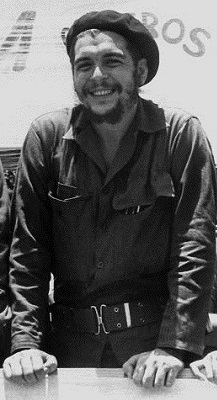|
~ Ernesto Che Guevara
~ Galéria
~ Oldal
~ Bejelentkezés
~ Vissza a Főoldalra
Ernesto Che Guevara, az argentin származású forradalmár, miniszter, gerillavezér és író, Buenos Aires-ben szerzett orvosi diplomát, majd a kubai forradalom során jelentős szerepet játszott a szigetország felszabadításában és újjáépítésében. A kubai gazdaság talpraállításáért dolgozott, küzdött az oktatás és az egészségügy fejlesztéséért, az írástudatlanság és a faji előítéletek felszámolásáért. Saját példájával népszerűsítette az önkéntes munkát. Kongóban és Bolíviában is harcolt - harminckilenc éves volt, amikor az amerikai-bolíviai csapatok csapdába ejtették és kivégezték.
| | |
|

| | |
|
|
|
Martin Guevara: Leftist, Rightist or Centrist?
|
|
|
Here you can read a long interview with Martin Guevara, Che Guevara's nephew.
Martin is not really a supporter of the Cuban Revolution, (he can enter the country anytime but he is not allowed to live there anymore), but he is quite open-minded and not prejudiced - unlike Cuban exiles from Florida.
In this fresh interview (published on 27th May) Martin Guevara talks about Che, Fidel Castro and Cuba, among other things, frankly.
Teaser:
"I believe that he [Che] had the uncommon quality of always putting his own skin on the line for what he thought, of not lying even about this, when he said in the United Nations, “We have shot, we continue to shoot and we will shoot more,” in a very harsh declaration. Today in this world where hundreds of millions are dead because of avarice and violence, I’d like to hear at least similar words from those responsible: “We have caused hunger, we still cause hunger and we will continue to cause hunger in Africa to obtain diamonds;” or “We have bombed, we bomb and we will bomb further to reap the benefits for ourselves,” etc."
[Read the whole article]
|
|
|


| | |
|
|
|
~ Ernesto Che Guevara
~ Gallery
~ Site
~ Log in
~ Back to the Main page
Ernesto Che Guevara, the Argentine-born revolutionary, minister, guerrilla leader and writer, received his medical degree in Buenos Aires, then played an essential part in the Cuban Revolution in liberating and rebuilding the country. He did his best to set up the Cuban economy, fought for the improvement of the education and the health system, the elimination of illiteracy and racial prejudice. He promoted voluntary work by his own example. He fought in the Congo and in Bolivia - he was thirty-nine years old, when he was trapped and executed by the joint American-Bolivian forces.
| | |
|
|

